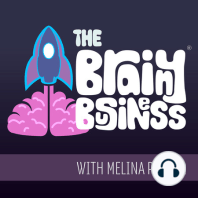51 min listen

48. An Overview of Memory Biases
FromThe Brainy Business | Understanding the Psychology of Why People Buy | Behavioral Economics
48. An Overview of Memory Biases
FromThe Brainy Business | Understanding the Psychology of Why People Buy | Behavioral Economics
ratings:
Length:
31 minutes
Released:
May 17, 2019
Format:
Podcast episode
Description
This behavioral economics podcast episode is about memories. Specifically, it will be an overview of memory biases Last week, we took a little break from our series on “all the biases” for a behavioral economics analysis of Costco. Today, we dig into memory. This topic will be divided into three sections. The first section is general memory stuff, then we will talk about false memories and wrap it up with some tips on how you can use these biases to help you remember things better! When we think about our brains and all the amazing things they do, much of what we are accessing are memories. This episode breaks it all down with some fun facts and cool tips about our memories that a lot of you may not know. CLICK HERE FOR YOUR FREE DOWNLOAD! Show Notes: [03:59] When we think about our brains and all the amazing things they do, much of what we are accessing are memories. [04:21] Most people think of our brains like a filing cabinet, but that's not how it works. [04:36] Our memories are basically inaccurate renditions our brains tell us...and every time we access them, we change them a little. [04:49] The more we think about something the less likely it is to be accurate. This is partially because of two biases called leveling and sharpening. [05:00] Memories can be distorted over time when details are lost. In this process, there may be selective recollection (where you only remember, sharpen and exaggerate certain portions of the memory). Or, it can be leveled out to fit some other biases that exist and just get a little dulled over time. Both of these are constantly reinforcing each other over time. [06:41] Our biases impact our memories and our present and future. [06:58] Because of the self relevance effect we find it much easier to recall memories about our self or things related to ourselves. [07:13] You are the hero of your own story, but even you don't remember your own story correctly. [07:20] Due to the fading effect bias, our brains like to feel positive emotions more than negative ones, so the emotions tied to bad memories will fade quicker than the emotions tied to positive events. This is likely tied to optimism bias and our ability to persevere through hardship. [07:54] Because of reminiscence bump, people do not remember things from all times of their life equally. Instead, people will have memories and be able to recall more personal events from happenings in early adulthood and adolescence than from any other time in their life. [08:35] We remember some time periods better than others, some items from years and years ago are able to be recalled “like it was yesterday.” [08:55] Due to the telescoping effect, we tend to think of recent events as being further back in time, and those which happened longer ago are placed more recent in our minds. [09:14] The peak end rule – where experiences are not about the sum of that entire experience over time. Instead, it is about how it was at its peak and how it ended. [10:12] If something bad happened, it might be worth putting in some effort to make sure that is not the last experience and instead have it be a midpoint negative item if you can, that becomes outweighed by some very positive peaks over time. [11:05] The tip of the tongue phenomenon. I am sure you have had this frustrating experience at least once – when you can almost remember something…and the word or phrase or moment or name of that movie is “on the tip of your tongue” – right? This is thought to happen due to blocking, when multiple memories that are similar to each other are being called upon at the same time. [12:23] A false memory is when we accidentally think something we imagined really happened, and misattribute it as a memory. [12:55] Think about selling – confidence is key to selling. Try and imagine what it would be like if you had done this successfully already, think through the whole memory to help make it as real as possible. When you believe it, that could make future selling easier. [14:0
Released:
May 17, 2019
Format:
Podcast episode
Titles in the series (100)
1. Unlocking The Secrets Of The Brain: That is what behavioral economics is all about. And it is what I am so passionate about. by The Brainy Business | Understanding the Psychology of Why People Buy | Behavioral Economics